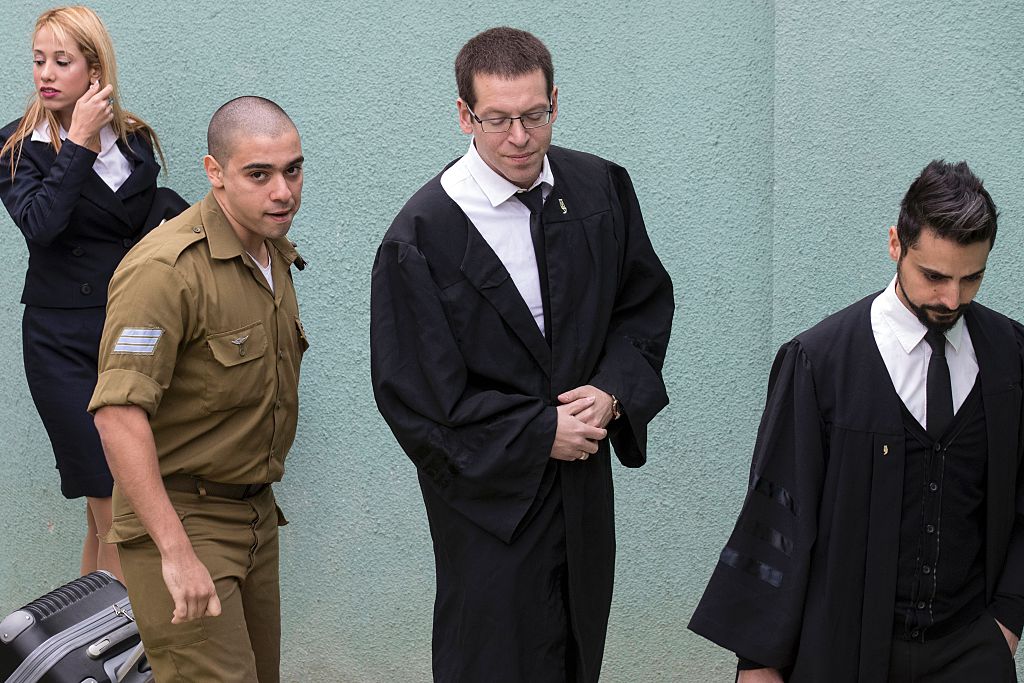Israeli court convicts IDF soldier who killed immobilized Palestinian


A free daily email with the biggest news stories of the day – and the best features from TheWeek.com
You are now subscribed
Your newsletter sign-up was successful
On Wednesday, a three-judge Israeli military court convicted Sgt. Elor Azaria of manslaughter for fatally shooting a 21-year-old Palestinian attacker who had already been stripped of his knife and immobilized by Israeli forces. The March 24 incident in the West Bank town of Hebron, following a knife attack on an Israeli solider by Abdul Fattah al-Sharif and a friend, was captured on film and released by an Israeli human rights group. In the video, Azaria, 20, is seen shooting a motionless but breathing Sharif in the head from several yards away; a fellow Israeli Defense Forces (IDF) soldier testified at the high-profile trial that Azaria had told him that Sharif "deserves to die."
The trial divided Israel, with far-right protesters and politicians urging Azaria be released and top military officials stating that the soldier's actions did not reflect IDF values. The chief judge, Col. Maya Heller, read from the verdict for more than two hours, saying Azaria had killed Sharif out of revenge and "one cannot use this type of force, even if we're talking about an enemy's life." The maximum sentence for manslaughter is 20 years in prison.
A free daily email with the biggest news stories of the day – and the best features from TheWeek.com
The Week
Escape your echo chamber. Get the facts behind the news, plus analysis from multiple perspectives.

Sign up for The Week's Free Newsletters
From our morning news briefing to a weekly Good News Newsletter, get the best of The Week delivered directly to your inbox.
From our morning news briefing to a weekly Good News Newsletter, get the best of The Week delivered directly to your inbox.
Peter has worked as a news and culture writer and editor at The Week since the site's launch in 2008. He covers politics, world affairs, religion and cultural currents. His journalism career began as a copy editor at a financial newswire and has included editorial positions at The New York Times Magazine, Facts on File, and Oregon State University.
-
 Antonia Romeo and Whitehall’s women problem
Antonia Romeo and Whitehall’s women problemThe Explainer Before her appointment as cabinet secretary, commentators said hostile briefings and vetting concerns were evidence of ‘sexist, misogynistic culture’ in No. 10
-
 Local elections 2026: where are they and who is expected to win?
Local elections 2026: where are they and who is expected to win?The Explainer Labour is braced for heavy losses and U-turn on postponing some council elections hasn’t helped the party’s prospects
-
 6 of the world’s most accessible destinations
6 of the world’s most accessible destinationsThe Week Recommends Experience all of Berlin, Singapore and Sydney
-
 The countries around the world without jury trials
The countries around the world without jury trialsThe Explainer Legal systems in much of continental Europe and Asia do not rely on randomly selected members of the public
-
 The Supreme Court case that could forge a new path to sue the FBI
The Supreme Court case that could forge a new path to sue the FBIThe Explainer The case arose after the FBI admitted to raiding the wrong house in 2017
-
 ABC News to pay $15M in Trump defamation suit
ABC News to pay $15M in Trump defamation suitSpeed Read The lawsuit stemmed from George Stephanopoulos' on-air assertion that Trump was found liable for raping writer E. Jean Carroll
-
 Judge blocks Louisiana 10 Commandments law
Judge blocks Louisiana 10 Commandments lawSpeed Read U.S. District Judge John deGravelles ruled that a law ordering schools to display the Ten Commandments in classrooms was unconstitutional
-
 Swearing in the UK: a colourful history
Swearing in the UK: a colourful historyIn The Spotlight Thanet council's bad language ban is the latest chapter in a saga of obscenity
-
 ATF finalizes rule to close 'gun show loophole'
ATF finalizes rule to close 'gun show loophole'Speed Read Biden moves to expand background checks for gun buyers
-
 Hong Kong passes tough new security law
Hong Kong passes tough new security lawSpeed Read It will allow the government to further suppress all forms of dissent
-
 France enshrines abortion rights in constitution
France enshrines abortion rights in constitutionspeed read It became the first country to make abortion a constitutional right
